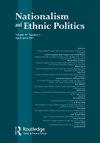Why Do People Discriminate against Jews?
IF 1.1
Q3 ETHNIC STUDIES
引用次数: 1
Abstract
by events. Nevertheless, from time to time, there are passages of the book that still resonate. For example, while explaining the changes in the impact of nationalism in the third period, he writes: “This does not mean that individuals became in this period more outrageously nationalist in sentiment or more unwilling to co-operate with their fellow-men of other nations” (p.15) and “evil men will always be found to turn an unhealthy situation to account” (p.23). How changes in the wider international context shape the character of political movements remains an area that deserves more attention than it typically receives. Another example: “The movement which dismembered Austria-Hungary and created Yugoslavia and Czechoslovakia was bound to be succeeded by movements for the dismemberment of Yugoslavia and Czechoslovakia” (p.19). A critic might mutter that while events were ultimately to vindicate Carr’s judgment about the long-term future of these two countries, this was to take a number of generations. His postscript contains a statement that will raise a smile among readers; “It is conceivable that a shattered Europe, rising above the national hatreds and conflicts of the past, may throw up from within a new and unifying leadership which would enable her to develop and hold a position independent of both Britain and Russia” (p.59). Admittedly, both the “Britain” and “Russia” that Carr was envisaging when he wrote these words have long gone. Another part of the problem of the book, from the perspective of today’s readers, is that it advances propositions about the politically contingent nature of nationalism that have become so well established and so widely accepted that they do not require justification through reference to classic texts, whether by Carr or anyone else. Indeed, what most scholars of nationalism continue to grapple with is explaining the continuing potency of specific nationalisms, in spite of the debunking of nationalist myths of every kind. Included in the book are a series of endorsements of the new edition from leading scholars. Their warm welcome for its publication is primarily focused on Cox’s introduction. That is fully deserved. It may also be read as a suggestion to readers that they should not expect too much from Carr’s commentary itself.为什么人们歧视犹太人?
通过事件。尽管如此,书中仍不时有一些段落引起共鸣。例如,在解释民族主义在第三个时期影响的变化时,他写道:“这并不意味着个人在这一时期的民族主义情绪变得更加肆无忌惮,或者更不愿意与其他国家的同胞合作”(第15页),“人们总是会发现邪恶的人在利用不健康的情况”(第23页)。更广泛的国际环境中的变化如何影响政治运动的性质,仍然是一个值得比通常得到更多注意的领域。另一个例子是:“肢解奥匈帝国和建立南斯拉夫和捷克斯洛伐克的运动必然会有肢解南斯拉夫和捷克斯洛伐克的运动接替”(第19页)。批评者可能会嘀咕说,虽然事件最终证明了卡尔对这两个国家长期未来的判断是正确的,但这需要几代人的时间。他的后记中有一段话会让读者微笑;“可以想象,一个破碎的欧洲,从过去的民族仇恨和冲突中崛起,可能会从一个新的统一的领导层中产生,这将使她能够发展并保持独立于英国和俄罗斯的地位”(第59页)。诚然,卡尔写下这些话时所设想的“英国”和“俄罗斯”早已不复存在。从今天读者的角度来看,这本书的另一个问题是,它提出了关于民族主义的政治偶然性本质的命题,这些命题已经得到了如此充分的确立和广泛的接受,以至于它们不需要通过参考经典文本来证明,无论是卡尔还是其他任何人。事实上,尽管各种民族主义神话都已被揭穿,但大多数研究民族主义的学者仍在努力解释特定民族主义的持续效力。书中包含了一系列来自主要学者对新版的认可。他们对其出版的热烈欢迎主要集中在考克斯的介绍上。这是完全应得的。这也可以理解为对读者的一种建议,即他们不应该对卡尔的评论本身期望过高。
本文章由计算机程序翻译,如有差异,请以英文原文为准。
求助全文
约1分钟内获得全文
求助全文
来源期刊

Nationalism and Ethnic Politics
ETHNIC STUDIES-
CiteScore
1.30
自引率
0.00%
发文量
30
期刊介绍:
Nationalism & Ethnic Politics explores the varied political aspects of nationalism and ethnicity in order to develop more constructive inter-group relations. The journal publishes case studies and comparative and theoretical analyses. It deals with pluralism, ethno-nationalism, irredentism, separatism, and related phenomena, and examines processes and theories of ethnic identity formation, mobilization, conflict and accommodation in the context of political development and "nation-building". The journal compares and contrasts state and community claims, and deal with such factors as citizenship, race, religion, economic development, immigration, language, and the international environment.
 求助内容:
求助内容: 应助结果提醒方式:
应助结果提醒方式:


